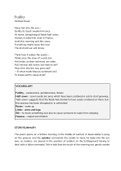Summary
Summary Poem Analysis of 'Futility' by Wilfred Owen
Here’s a full analysis of the poem ‘Futility’ by Wilfred Owen, tailored towards A-Level students but also suitable for those studying at a higher level. Includes: POEM VOCABULARY STORY / SUMMARY SPEAKER / VOICE LANGUAGE FEATURES STRUCTURE / FORM CONTEXT ATTITUDES THEMES
[Show more]




